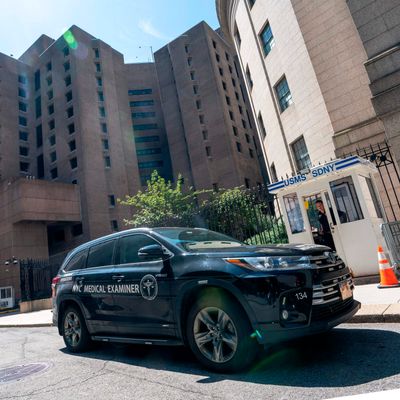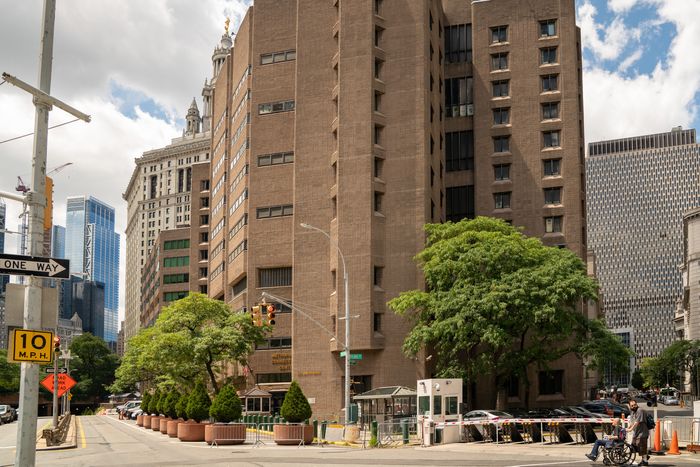
By far the most shocking aspect of Jeffrey Epstein’s death by suicide in his Manhattan jail cell on Saturday was that it could have happened at all.
The high-living multimillionaire, who was facing sex-trafficking charges and the likelihood of spending the rest of his life behind bars, had reportedly been placed on suicide watch after an earlier suspected attempt. It seemed inexplicable that such a high-profile inmate could have gotten a second opportunity to take his own life — thus denying his victims, for a second time, their chance for justice. And it was no surprise that many observers responded to the news by becoming instantly sympathetic to conspiracy theories regarding Epstein’s sudden demise.
There are still many unanswered questions about Epstein’s death and at least three government investigations (and numerous journalists) now trying to answer them. Regardless of what those investigations uncover, the government’s attempt to safeguard Epstein and ensure he lived to stand trial and face justice was a spectacular failure.
Below is a guide to the key details and areas of inquiry regarding how that happened.
What was Epstein’s official cause of death?
The Department of Justice’s official statement on Saturday morning said that Epstein had been found unresponsive in his cell as a result of “an apparent suicide.” Numerous news organizations reported that he had hanged himself, but there have been no reported details about how or what he might have used to do so.
Epstein’s official cause of death has still not been announced. New York Medical Examiner Barbara Sampson said on Sunday that she had completed an autopsy of Epstein, observed by a private pathologist, but that she needed more information to make her official determination of his cause of death. Stay tuned, in other words.
What happened with Epstein’s previous suicide attempt?
Jeffrey Epstein had survived what appeared to be a previous suicide attempt last month. On July 23, Metropolitan Correctional Center personnel had found the 66-year-old semiconscious on his cell-room floor with marks on his neck.
There were unconfirmed rumors that Epstein had been attacked, but MCC officials treated the incident as a suicide attempt and put Epstein on suicide watch. That meant transferring him from the MCC’s special-housing unit to a special cell where he was constantly monitored and prevented from having access to any objects or architectural features he could use to harm himself. Suicide-watch inmates are monitored by MCC staff or a designated inmate companion 24 hours a day and receive daily psychiatric evaluations.
It would have been extraordinarily difficult for Epstein to die by his own hands while housed and monitored in this way.
Why was Epstein no longer on suicide watch at the time of his death?
On July 29, six days after he was put on suicide watch, Epstein was reportedly cleared and returned to the MCC’s special-housing unit. That means he had received a psychiatric evaluation and it was determined that he no longer posed a risk to himself — if the process followed proper procedures.
Who made the decision to end Epstein’s suicide watch, and who else knew about it?
Typically, the suicide-watch designation is determined by a facility’s chief psychiatrist. But the Wall Street Journal reported on Monday that Epstein was taken off at the request of his lawyers.
The New York Times reported Sunday that the Justice Department knew about this transfer and had been assured by MCC officials that per standard procedure, Epstein would be housed with a cellmate and checked on every 30 minutes following his suicide watch.
On the night of his death, however, Epstein was reportedly alone in his cell, and the two guards on duty did not conduct the 30-minute check-ins on him. According to a source who spoke with the Washington Post, guards did not check on Epstein for “several” hours before his body was found.
How did Epstein end up alone in his cell in violation of MCC procedures?
When Epstein was returned to the special-housing unit on July 29, he was placed in a cell with a metal door and a small glass window with another, as-of-yet unidentified inmate in accordance with MCC procedures. Sometime later — it’s not yet clear when — Epstein’s cellmate was transferred out of the special-housing unit and he was not assigned another cellmate. It’s not clear how that was allowed to happen, or for how long, but Epstein was alone on Friday night and found alone, dead in his cell, on Saturday morning.
Bernard Kerik, the (disgraced) former commissioner of both New York City’s Department of Correction and Police Department, speculated on Saturday that Epstein’s solitary confinement may have been deliberate, calling it a “mechanism to demean, degrade, and demoralize a prisoner.”
“The mind-altering seclusion of ‘solitary’ will force a prisoner into a deep depression from which, for some, there is no return,” Kerik added.
Why didn’t MCC guards conduct required check-ups on Epstein on the night of his death?
Two guards were on duty in the MCC’s special-housing unit on the night of Epstein’s death. According to several reports, they did not conduct the required checks on Epstein every 30 minutes. It’s not yet confirmed why, but some officials have stressed that the guards were overworked thanks to a staffing shortage at the facility. The names of the guards have not been confirmed as of Sunday evening.
Is there a staffing shortage at MCC, and did it play a role in Epstein’s fate?
An unnamed prison official told the New York Times that both guards were on overtime on Friday night, and one was on a fifth consecutive overtime shift. Serene Gregg, the president of the local union, went even further in her comments to the Washington Post. She said that the employees were forced to work that night and were not correction guards in their normal roles, though they did have the training to do the job. Gregg claimed that the MCC has been operating with less than 70 percent of the correction officers it needs, forcing many employees, like the two guards on Friday night, to work 60-to-70-hour weeks thanks to mandatory overtime.
If that’s true, that kind of work environment may have contributed to all the failures that seem to have made Epstein’s death possible.
What other precautions did the MCC take to safeguard Epstein, and what was his state of mind?
It’s not yet clear that jail officials took any additional precautions regarding Epstein’s safety. “A person with knowledge of his circumstances” told the Daily Beast on Saturday that Epstein received no preferential treatment following his return from suicide watch, but he had a cell to himself:
He did get a cell to himself in the unit, where the rich man “lived like a pig in a sty” after that attempt, the person said, eating his meals off of the floor and constantly requesting more toilet paper. In conversations with other inmates, he at times asked for their inmate numbers, presumably to put money into their accounts.
Is there security-camera footage of what happened to Epstein? If not, why?
The New York Post reported on Sunday that no surveillance footage existed of Epstein’s death. According to its sources, surveillance cameras in that part of the jail do not show the inside of the cells or the areas outside of them. It is not clear why, but it appears to have been by design.
Who is investigating Epstein’s death?
The Justice Department announced on Saturday that the FBI was investigating Epstein’s death — meaning the law-enforcement agency would be looking to see if a crime was committed.
Attorney General William Barr said on Saturday that he was “appalled” that Epstein had died while in federal custody and had directed the Department of Justice’s inspector general to launch an investigation. On Monday, he said the Justice Department had found “serious irregularities” at the Metropolitan Correctional Center, and that prison staff had “failed to adequately secure this prisoner,” but did not go into further detail.
The New York City medical examiner’s office has been conducting its own investigation into Epstein’s death as well, but it hadn’t released the results of Epstein’s autopsy as of Monday.
What did Justice Department officials know? How high up will this scandal go?
The Justice Department’s Bureau of Prisons runs the Metropolitan Correctional Center, but it’s not yet clear who, if anyone, was aware of the MCC’s failures to follow procedure regarding Epstein or about the facility’s alleged staffing shortage.































